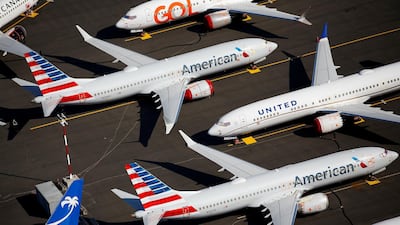A global flying ban on Boeing's 737 Max, the US manufacturer's top-selling jetliner, is entering its seventh month after two fatal crashes in Ethiopia and Indonesia that killed 346 people. The aircraft grounding sent shockwaves through the aviation industry, disrupted airlines' operations, dented Boeing's finances and created a rift among global air safety regulators. Boeing's bill so far is an estimated $8 billion (Dh29.4bn) in Max-related expenses through to July as it faces questions about the plane's development and certification.
When will the Boeing 737 Max fly again?
Uncertainty remains over when the single-aisle industry workhorse will resume commercial flights. Boeing estimates the aircraft could return to service in the fourth quarter of 2019. The UAE aviation regulator's chief said he was “not very optimistic” about Boeing's timeline and that the first quarter of 2020 was a more likely schedule. The US Federal Aviation Administration (FAA) reiterated it has no firm timeline for lifting the ban. Southwest Airlines, the biggest operator of the grounded plane, has suspended Max flights through early January.
Regulators in Europe, China, Canada and the UAE have said they will conduct their own assessment of the aircraft's airworthiness. The International Air Transport Association (IATA) has encouraged regulators to take a unified approach on the timeline and measures needed to return the Max to the skies.
What are the repercussions of the ban for the airline industry?
Global carriers are grappling with operational and financial after-effects of the ban. Airlines operating the 737 Max were forced to cancel flights, cut routes, operate older aircraft models and take financial losses. However, the ban was less disruptive because there are more jets on Boeing's order backlog than there are planes in service. Southwest scrapped an average of 200 weekday flights from its schedule through to January 5, 2020. Flydubai, which idled 14 of the 250 Maxs it ordered, said the grounding hurt its first-half performance and set its operating fleet back five years. In July, Saudi Arabia's budget carrier Flyadeal dropped the 737 Max, scrapping a commitment to buy as many as 50 of the narrowbody jets, in favour of rival Airbus A320 Neo model.
What does this mean for Boeing?
The Chicago-based aerospace giant has spent months working on a software fix for the flight control system that has been implicated in both crashes with the aim of winning the FAA approval for the planes to fly again. The US planemaker is facing several probes into its 737 Max jet development and certification process from aviation regulators, lawmakers and the US Department of Justice amid questions over its transparency and safety culture. Boeing chief executive Dennis Muilenburg is set to testify on October 30 before the US House Committee on Transportation and Infrastructure for a hearing on the 737 Max.
He is carrying out a board-ordered revamp that gives directors a direct view of concerns raised by employees, while adding initiatives of his own to boost the focus on safety. Mr Muilenburg, facing Boeing's worst crisis in its 103-year history, has apologised for the air accidents and said the situation “will continue to weigh heavily on our hearts and on our minds for years to come.”
Will passengers feel confident to board the jet?
Boeing must win the confidence of regulators, pilots and travellers. A UBS survey about public opinion on flying aboard a 737 Max has not improved in recent months. UBS analyst Myles Walton said that 67 out of 68 respondents in the latest survey have cited the Max as the top issue for the stock.
What is the cause of the crash? What is the MCAS and what does it do?
In both crashes, pilots were struggling with the Manoeuvering Characteristics Augmentation System (MCAS), a flight control system that kicked in due to an erroneous sensor reading that pushed the plane-nose downwards.
So, what's next?
Boeing must submit its flight software update for regulatory approval, which will be followed by a certification test flight. The FAA must approve the jet for service after it approves the software fixes, pilot training updates and test flights. Some global regulators have said they will conduct their own checks, meaning it is possible that not all Max operators will have approvals to fly the jet concurrently.


